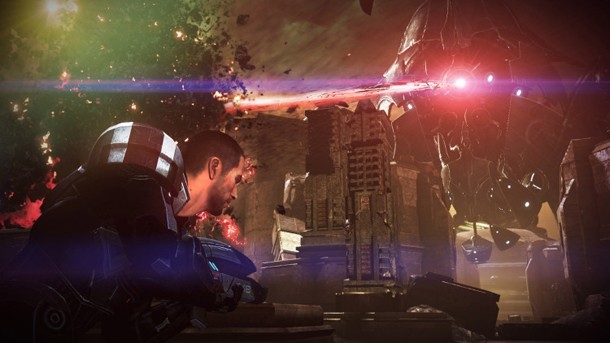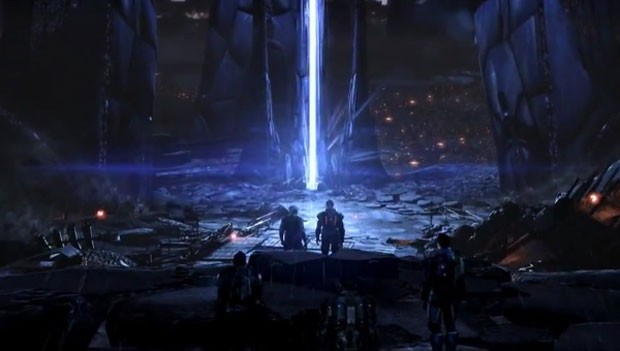Please support Game Informer. Print magazine subscriptions are less than $2 per issue
My Thoughts On Mass Effect 3's Ending

Last night around 2:00am I finished Mass Effect 3 after weeks of dodging spoilers. As the credits rolled I absorbed everything I had done in the final pivotal moments of the game. I also reflected on all the controversy and general hullabaloo that has been stirred up by petitioners and angry fans since the game’s release. I’ve finally caught up on all the drama, and I have to say I’m happy with the ending.
Note: This blog post contains Mass Effect 3 spoilers.
An uncharacteristic tone of gruffness and desperation snuck into Shepard’s voice nearing the end of the game. Clearly, things were getting worse for the galaxy by the minute, and the strain was starting to show. None of that steady escalation could prepare me for how I felt when the Harbinger’s beam nearly wiped out everyone during that final push towards the beam connecting Earth to the Citadel. I was reminded of Solid Snake’s arduous trek through the microwave corridor at the end of Metal Gear Solid 4, but with all the added emotional weight of the Mass Effect series’ remarkable story. Shepard was in rough shape, and watching the normally stoic commander so bloodied and battered stirred in me a fear that I had screwed something up and the galaxy would suffer because of it.
The Illusive Man’s appearance at the Crucible control panel was a bit of a surprise, but given the sneaky jerk knew the Citadel was the catalyst for the Crucible, I guess I was expecting him to show up at some point. The indoctrinated Cerberus boss pressed Shepard hard to make him see why controlling the Reapers was a better solution than destroying them, but I squeezed every last drop of paragon juice I’d been accumulating across three games to make that *** shoot himself in the head. The Illusive Man has stood as one the most stubborn, deluded characters in the Mass Effect universe since ME 2, and the fact that I had become so charismatic and persuasive that he committed suicide because of my words was a powerful feeling.
The introduction of the “god child” character at the very end of the game was a twist I didn’t see coming. The wispy image of the dead child that haunted Shepard did wonders for explaining the Reapers purpose to me, and what exactly my options were. I boarded the Citadel with the intent to finish off the Reapers, and I committed to achieving that goal despite the cost of destroying all synthetic life. I thought about Edi, Legion, and the entire Geth population before making this decision. It sucked, but it seemed like the best option. How long would Shepard be able to control the Reapers if I had went with the blue ending, and isn’t it unfair to push synthetic hybridization onto all sentient life? I understand that destroying synthetics may seem brutal, but let’s face it – they’re not alive. That’s how I rationalized it, anyway.

I enjoyed the rest of the end sequence as well, from Joker fleeing from the mass relay explosions to the enigmatic epilogue of an old man telling stories of “The Shepard” to his son. I love the prospect of the Normandy crew having to start over on a lush jungle planet. Joker, Garrus, Liara, and the rest of the crew are damned heroes, and would be fantastic leaders for a new civilization. And that’s just the Normandy crew – think of all the Quarians, Turians, Humans, and the rest stuck in our solar system. What will happen to them? Will they be able to nurture Earth back to health after the Reapers razed it? I love pondering the wealth of questions raised by the end of Mass Effect 3, and the implications it has for future games in the series.
That brings us to an inevitable point: there are many who are unhappy with these loose ends. I’m not here to try and discount those opinions, but I think we’ll be slipping into dangerous territory if Bioware changes too much of the ending with extra content or an update. Some of my favorite films and novels conclude in uncertainty, with outcomes that are open to interpretation. Cormac McCarthy’s The Road, Joel and Ethan Coen’s A Serious Man, and David Lynch’s Twin Peaks all come to mind. Would it be right to change those endings because a vocal crowd of dissenters didn’t dig them? Like Mass Effect 3, I enjoyed every moment I spent with these tales, and the experience was made even richer because of the discussions fostered by their ambiguity. I’m proud to see how carefully fans have nit-picked the conclusion, and I hope those dedicated folks found some joy while on their crusade to get things changed. Few video game universes are worthy of such investment, and analyzing them so closely can make you appreciate them even more.
An ending as polarizing and controversial as Mass Effect 3 has merit. How many other game endings have gotten so many people all talking at once? A good story is meant to evoke emotion. Sometimes that feeling is uncertainty or sadness. While those feelings are generally thought of negatively, an ending isn’t automatically bad because it made you feel them. Unhappy endings can be done well. I feel Bioware managed to evoke these feelings in an interesting, worthwhile way. I’m sad about Shepard and the vulnerable state of the galaxy, but I don’t feel cheated. Across three games I saved an entire species, led a flawless suicide mission, ended a long-running war in peace, and destroyed the Reapers. In my eyes, it’s been a damned fine adventure, and I wouldn’t trade my ending for anything.










